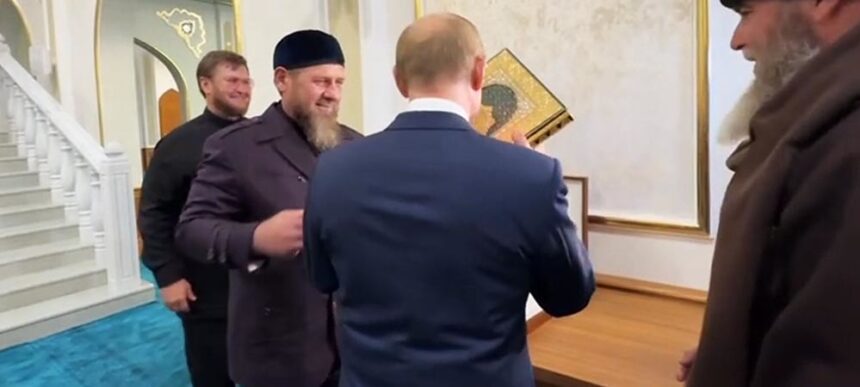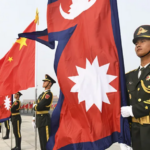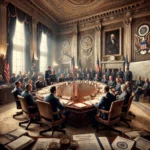The recent release of images showing Russian President Vladimir Putin kissing the Quran during his visit to Chechnya in late August has reignited discussions about his use of religious symbolism. This is not the first time Putin has demonstrated respect for religious icons in public. In 2015, during a state visit to Iran, he presented a precious Quran to Ayatollah Ali Khamenei, Iran’s Supreme Leader. He has also been seen participating in Orthodox Christian rituals, lighting candles, and kissing icons of the Virgin Mary. These gestures, combined with images of Putin meeting with Jewish rabbis during a 2011 visit to the United States, portray a leader who seemingly embraces religious diversity. But are these gestures an expression of genuine faith or a calculated political strategy?
A Complicated Religious Background
Vladimir Putin’s religious identity is shrouded in ambiguity. Born in Soviet Leningrad in 1952, Putin was raised in a society where religious expression was strictly controlled. His father, Vladimir Spiridonovich Putin, was a staunch Soviet nationalist who fought in World War II, while his mother, Maria Ivanovna Putin, was reportedly deeply religious. It is said that Putin was secretly baptized as an infant—a bold act in a time when such actions could have led to severe punishment. This personal anecdote has been widely circulated, enhancing his appeal among devout Christians, though some critics argue that it may be part of a carefully crafted public image.
Throughout his political career, Putin has maintained a strong religious presence. During a meeting with former U.S. President George W. Bush, he showcased a small aluminum cross he wears around his neck, emphasizing his personal connection to his Orthodox Christian faith. His relationship with the Russian Orthodox Church is a significant aspect of his leadership, echoing historical ties between the Church and the state that date back to the Tsarist era.
Religion as a Unifying Force
Ahmad Vakhshiteh, a professor at the Peoples’ Friendship University of Russia, views Putin’s religious gestures as part of his strategy for governing a multi-religious society. “Religion in Russia is a personal matter, and public preaching is forbidden. However, Putin views religion as a unifying force, and his gesture of kissing the Quran in Chechnya should be seen in that light,” Vakhshiteh explains.
Putin’s approach to religion is pragmatic. He tailors his gestures to resonate with different groups. For instance, during a 2017 meeting with King Salman of Saudi Arabia, Putin quoted a Quranic verse about the protection of Muslims, shortly before offering the Saudis the opportunity to purchase Russia’s latest missile system, the S-500. By engaging with religious leaders and communities on their terms, Putin seeks to position himself as a bridge between Russia’s many faiths, using religion to temper political threats like radical Islamism in Chechnya and Central Asia.
Moreover, Russia’s 2023 political doctrine, signed by Putin, includes a section on the Islamic world, highlighting Russia’s strategic view of Islam. By cultivating relationships with Muslim leaders and symbolically endorsing Islamic texts, Putin has created a narrative of religious inclusivity that enhances his influence in Muslim-majority regions.
Religion as a Political Instrument
Despite Putin’s religious overtures, not everyone believes he is a devout believer. International affairs analyst Amir Chahaki argues that Putin manipulates religion to solidify his political power, drawing comparisons between Putin and the Russian Tsars. “Putin views the Orthodox Church as a tool of power. He approaches Islam the same way. With [Chechen leader] Ramzan Kadyrov in power, Putin uses religion to control him,” Chahaki claims.
Putin’s displays of religious unity, like kissing the Quran, are, in Chahaki’s view, political moves aimed at showing that he transcends Orthodox Christianity. These gestures, however, do not reflect genuine religious devotion but are part of a broader strategy to co-opt religious institutions for political legitimacy.
The relationship between the Russian Orthodox Church and the state is particularly significant. Historically, the Church has been closely intertwined with Russian political authority, dating back to the Byzantine Empire and continuing through the reign of the Tsars. Today, Putin uses the Church not only to enhance his domestic standing but also to project an image of Russia as a protector of conservative, traditional values on the global stage.
The Ukraine War and Religious Fallout
The ongoing war in Ukraine has further complicated Putin’s relationship with religion, particularly the Orthodox Church. Prior to Ukraine’s decision to split from the Russian Orthodox Church, around 30% of Russian Orthodox followers were Ukrainian. The split, finalized five years ago, dealt a significant blow to the Russian Church’s influence. As the war continues to escalate, with thousands dead and millions displaced, Putin’s standing within the Orthodox community is being questioned.
At the beginning of the war, Theodore II, Patriarch of the Orthodox Church of Alexandria and All Africa, delivered a pointed message to Putin: “You cannot claim to love God while killing people.” This statement underscored the growing rift between Putin and some religious leaders, who are increasingly critical of the war in Ukraine. Despite his efforts to maintain the Church’s support, dissent within the Orthodox community is on the rise, potentially threatening one of Putin’s key pillars of legitimacy.
Conclusion: A Complex Triangle of Power
Putin’s relationship with religion is multifaceted, blending personal history, political strategy, and symbolic gestures. Whether or not he is genuinely religious remains unclear, but what is certain is that Putin has masterfully used religious symbolism to advance his political agenda. By positioning himself as a protector of Russia’s diverse religious traditions, he has bolstered his authority domestically and internationally.
However, as the war in Ukraine rages on and opposition grows within the Orthodox Church, Putin’s ability to navigate the complex triangle of religion, war, and power will be tested. The coming years will reveal whether his strategic use of religion will continue to serve him or become a source of dissent within his carefully constructed political image.
By: Amir Soltanzadeh – researcher and journalist specializing in Middle Eastern and Iranian geopolitics with extensive experience covering these regions.







